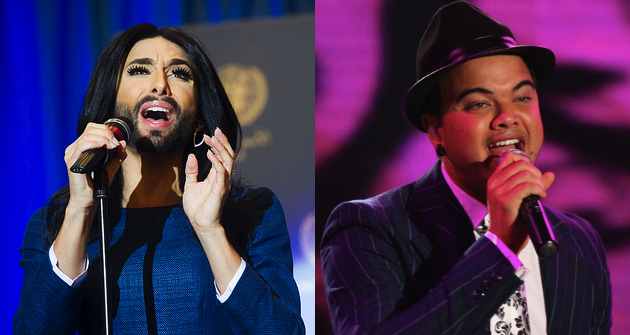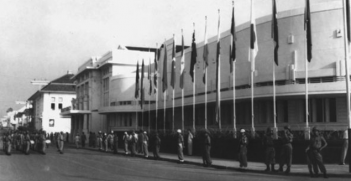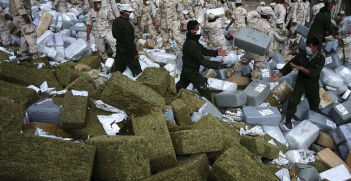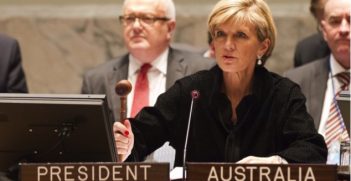Glitz Meets Politics: an Australian Viewer's Guide to Eurovision Voting

There is no denying that Eurovision is political, and separating the geopolitics of Europe from this contest remains impossible.
After years of being sidelined as observers, 2015 marks the year Australians can finally get involved in the Eurovision Song Contest. Not only will Guy Sebastian become our first official entry, but Australians will also get the opportunity to formally participate in voting for a winner.
Eurovision began as an experiment by the European Broadcasting Union (EBU) in 1956. At the time, the idea of having many countries compete in a live television contest across an international network of broadcasters was both ambitious and unheard of.
Over the years Eurovision has transformed from being a relatively serious song contest to the kitschy cult spectacle we know and (secretly) love today.
The contest has also proven over time to be an interesting microcosm of international relations within Europe. In 2011, The Atlantic described Eurovision as being “a political battlefield, where you need advice from Henry Kissinger as much as Simon Cowell” as entrants can use its voting system to support allies, strengthen regional blocs and punish their neighbours.
No joke as enemies and allies battle over Eurovision points
Keen Eurovision buffs may remember the 2003 British entry, “Cry Baby” by Jemini. It has the dubious honour of being the only English language entry to ever receive the dreaded “nul points”, as well as the only British entry ever to receive zero points.
Aside from Jemini being painfully out of tune, there was speculation that their failure was in fact a clear message from Britain’s neighbours that they did not approve of the British government’s decision to join the United States in its invasion of Iraq.
Some have even gone as far as to suggest that Britain’s consistently poor performances at Eurovision over the past two decades illustrate a cooling of British-Europe relations, something that will be no doubt tested in light of the possibility of an “in-out” British referendum on European Union membership.
More recently, in 2014, all eyes were on Russia’s and Ukraine’s entries. Previously, the two countries had exchanged votes with each other, but in light of Russia’s intervention in Crimea, the contest was now seen as a “music propaganda battleground” with both sides being booed by the opposition.
Moscow would have been less than impressed by the fact that televoters in Crimea would be counted as Ukrainian, not Russian (interestingly, Russia finished behind Ukraine). Ukraine will not be participating in the 2015 competition due to limited financial resources caused by the conflict.
Russia is no stranger to Eurovision controversy; in 2013 Russian ally Azerbaijan awarded Russia “nul points” while Russia awarded Azerbaijan the maximum 12 points.
Azerbaijan’s President Ilham Aliyev ordered an inquiry into the missing points, as local mobile phone operators’ records show that Russia actually received the second-largest share of Azeri votes. The Russian foreign minister took time out of his busy schedule to threaten the contest over these missing votes.
The voting blocs to watch
As Russians and Azeris may attest, voting is taken very seriously.
Accounting firm PriceWaterhouseCoopers oversees the voting process and verifies if jury and telephone voting is being conducted in accordance with the contest rules.
This followed a 2007 inquiry into whether participating countries engaged in block voting; yes, just like in the United Nations, voting blocs exist within the song contest and they roughly align with geo-politics.
While the 2007 inquiry found no formal evidence of voting blocs, there remains a body of research that indicates that they may exist.
These blocs supposedly “swap” votes in order to ensure each member has a chance of winning Eurovision. There are four broad “blocs” in existence:
- the “Viking Bloc” of Scandinavian countries
- the “Balkan Bloc” of countries including Croatia and Slovenia
- the previously mentioned “former Soviet bloc”
- and an unexpected rag-tag bloc comprising countries such as Britain, Ireland and Malta.
Researchers at University College London were able to establish that there are definite voting patterns. While it is difficult to prove that countries may “punish” other contestants through tactical voting, voters did exhibit positive biases based on culture, geography, history and migration.
For example, Greece appeared to be favoured by its neighbour Cyprus, thanks to the two countries sharing a geographical and cultural closeness. Turkey appeared to be consistently favoured by Germany, possibly due to a large Turkish diaspora resident in Germany. And from the “Balkan Bloc”, Albania appeared to be favoured by its neighbours Macedonia and Montenegro.
There is no denying that Eurovision is political. We need only look at last year’s winner, Austria’s Conchita Wurst. Conchita’s victory was seen as a defiant European vote against Russia’s appalling record on lesbian, gay, bisexual and transgender rights, and attracted criticism from Russian President Vladimir Putin.
It is difficult to separate the geopolitics of Europe from this contest. As Australia heads over to Vienna for the 2015 Eurovision Song Contest, we can only hope that Russia has forgotten all about last year’s “shirtfront” controversy.
Keshia Jacotine is a Teaching Associate at Monash University, Melbourne. This article was originally published in The Conversation on 19 May 2015. It is republished with permission.





